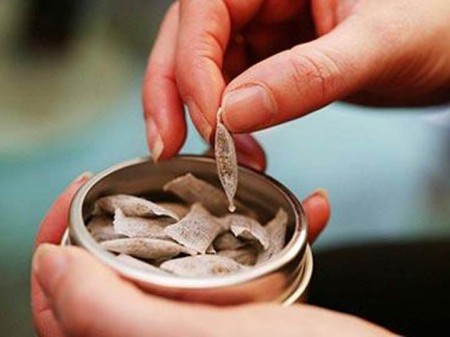Source: www.medpagetoday.com
Author: Shannon Firth
An FDA advisory panel were reluctant to recommend a gentler warning label for one brand of smokeless tobacco products at a committee hearing on Friday.
Swedish Match North America (SMNA), the first company to be considered for a modified risk tobacco designation by the FDA, is asking to replace a current label warning, “This product is not a safe alternative to cigarettes,” with this: “Warning: No tobacco product is safe, but this product presents substantially lower risks to health than cigarettes.”
It also wants to drop warnings required for other smokeless tobacco products about oral cancers, tooth loss, and gum disease.
In a key vote, the eight-member FDA’s Tobacco Products Scientific Advisory Committee split 4-4 on whether the claim that snus offer a “substantially lower risk” claim relative to cigarettes is justified.
Many members said the health risks were lower for certain tobacco-related illnesses, but not for all health concerns. Those who disputed the claim argued that it could not be taken as a “global statement” — as there are known risks to pregnant women and uncertain risks for adolescents.
As for the proposed label change, the whole committee agreed that the sponsor’s statements would not suffice. Gary Giovino, PhD, chair of the department of Community Health and Health Behavior at the State University of New York at Buffalo, felt the statement was “dismissive of the health risks.” The word “but” in any sentence seems to negate the first half, he said.
Snus is a finely ground smokeless tobacco powder in a filter packet that is placed under the upper lip.
In his opening remarks on Thursday, Mitch Zeller, JD, director of the FDA’s Center for Tobacco Products, said that in the past companies alone decided how to advertise their products — a practice which proved damaging to consumers’ health. “Now it’s the FDA who serves as the regulatory gatekeeper, standing between consumers and the companies seeking to make claims about their products.”
To meet the standards of a modified risk tobacco product, Zeller explained, “Applicants must not only demonstrate that the products, as actually used by consumers, will significantly reduce risks to individual users of those products; they must demonstrate that they will benefit the population as a whole – taking into account both users and non-users of tobacco products.”
In its application, Swedish Match has asked to revise the labels for 10 snus products. It would maintain its warning that smokeless tobacco is addictive.
Oral Safety Unproven
The committee was unmoved by the firm’s evidence related to gum disease and tooth loss and voted 8-0 against supporting a conclusion that snus products “do not pose a risk of gum diseases or tooth loss.”
Or as Thomas Novotny, MD, MPH, the graduate school of public health at the University of California San Diego State said, when explaining his vote, “It’s not causal relationships that we’re after, it’s perception of risk and the studies don’t rule that out.”
The committee’s vote was likely influenced by Scott Tomar, DMD, MPH, DrPH, of the department of Community Dentistry and Behavioral Science, at the University of Florida, who said that “advanced gingival recession can result in tooth loss.” One of the studies presented showed a relationship between gingival recession and snus use.
As to whether snus products also “do not pose risks of oral cancer” to consumers, the committee was split 3-3 with two abstentions.
“I think the data are tending towards no increased risk but I’m not quite ready to go there,” said Giovino, one of the abstainers.
Pebbles Fagan, PhD, MPH, associate professor and member of the Cancer Prevention and Control Program at the University of Hawaii, said that based on the absence of women in the larger cohort studies, she was not comfortable claiming that snus products posed no risk of oral cancer.
Can the ‘Swedish Experience’ Cross the Ocean?
Perhaps the most important questions the committee voted on was whether the proposed labeling change would help or harm consumers. Swedish Match threw the weight of its argument behind the “Swedish Experience,” a series of government, academic ,and industry studies showing a dramatic shift from cigarette smoking to snus in the mid-1990s. The firm argued that Swedish men reduced their risk of tobacco-related diseases.
But asked whether American tobacco users would likely follow suit — swapping cigarettes for snus — panel members were unconvinced.
Only one committee member said such a switch was likely, against six voting against and one abstention.
Richard O’Connor, PhD, associate professor of oncology at the Roswell Park Cancer Institute, in Buffalo New York, the lone panelist to agree that the experience in Sweden might translate to the U.S., said the data informed “a potential pattern in the U.S.”
Another subpopulation of obvious concern is adolescents. Timothy McAfee, PhD, MPH, director of the Office on Smoking and Health at the CDC, cited animals studies on tobacco addiction that showed “deleterious effects on adolescent brain development.”
On the plus side for Swedish Match, the majority of the committee felt it unlikely that nonusers of tobacco would pick up the snus habit, although three committee members abstained from this question because they did not believe there was enough data to support such a scenario.
Lars-Erik Rutqvist, the senior vice president of scientific affairs at Swedish Match said the company was pleased with the discussion at the hearing. “On the whole they seemed to accept the fact that there is a considerable risk reduction in our products and of course that’s very important. It’s part of the definition of a modified risk product.” Rutqvist added that he would expect to continue discussions with the FDA while awaiting their decision this summer.
“I look forward to the path forward for us.”
The FDA is not required to follow the advice of its advisory committee but it usually does.


Leave A Comment
You must be logged in to post a comment.